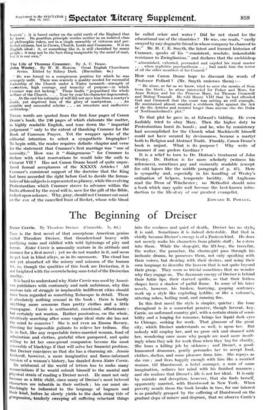The Life of Thomas Creamer. By A. C. Deane. John
Wesley. By W. H. Hutton. Great English Churchmen Series. Edited by Sidney Dark. (Macmillan. 68.)
•• He was forced to a conspicuous position for which he was strangely unfit. There was scarcely a quality needed for successful leadership of the Church under a Tudor monarch—strength of conviction, high courage, and tenacity of purpose—in which Cranmer was not lacking." These faults " jeopardised the whole welfare of the Church. . . . Year by year his character degenerated. . . . At the end his infirmity of will did not save him from a martyr's death, yet deprived him of the glory of martyrdom. . . . An amiable and successful scholar . . . an irresolute and ineffective archbishop."
7'itESE words are quoted from the first. four pages of Canon Deane's book, the 240 pages of which elaborate the matter, in highly readable English, and tone down the " impartial judgement " only to the extent of thanking Cranmer for the Book of Common Prayer. Yet the wrapper spoke of the editorial intention to select a sympathetic biographer ! To begin with, the reader requires definite chapter and verse for the statement that Cranmer's first marriage was " one of necessity." How was it " disingenuous " for Cranmer to declare with what reservations he would take the oath to (lenient VII ? Has not Canon Deane heard of quite unpre- faced formal acceptances of the XXXIX Articles ? All Cranmer's consistent support of the doctrine that the King had been accorded the right before God to decide the formu- laries of his subjects is represented aapliancy, while the evolving Protestantism which Cranmer strove to advance within the limits allowed by the royal will is, save for the gift of the Bible, looked upon askance. Why, pray, should not Creamer eat meat Da the eve of the cancelled feast of Becket, whose relic blood he called ochre and water ? Did he not stand for the educational use of the chantries ? He was, one reads, " easily swayed by any dogmatic friend in whose company he chanced to
be." Mr. H. C. E. Smyth, the latest and learned historian of Creamer, speaks of his " consistent, resolute, indomitable resistance to Zwinglianism," and declares that the archbishop
" admonished, exhorted, persuaded and cajoled his royal master . . . when syphilitic psychasthenia . . . had made him the terror of all the other members of his Council."
How can Canon Deane hope to discount the words of Professor Pollard ? (Mr. Smyth endorses them) :—
" He alone, so far as we know, tried to save the monks of Sion from the block ; he alone interceded for Fisher and More, for Anne Boleyn and for the Princess Mary. for Thomas Cromwell and Bishop Tunstall. Ho told Henry VIII that lie had offended God and Cromwell that the court was setting an evil example. He maintained almost unaided a stubborn fight against the Act of the Six Articles and resisted longer than anyone else the Duke of Northumberland's plot."
To that plot he gave in, at Edward's bidding. He even foolishly tried to obey Mary. Then the higher duty to Protestantism burst its bonds ; and he, who by consistency had accomplished for the Church what Machiavelli himself could not have secured by deviousness, became a martyr both to Religion and Abstract Truth. Frankly, Canon Deane's book is unjust. What is its purpose ? Why write of Cranmer if one prefers Gardiner ?
It is a relief to turn to Dr. Hutton's treatment of John Wesley. Dr. Hutton is far more scholarly (witness his references), sometimes gay and eminently readable (except for odd lapses like the middle paragraph of p. 47). Here is sympathy and, especially in his handling of Wesley's ordination of helpers, temperate lucidity. All Anglicans read the Dean of Winchester ; no Methodist should miss a book which may quite well become the best-known intro- duction to the life-story of our greatest evangelist.
EDWARD B. POWI.I.X.


























































 Previous page
Previous page